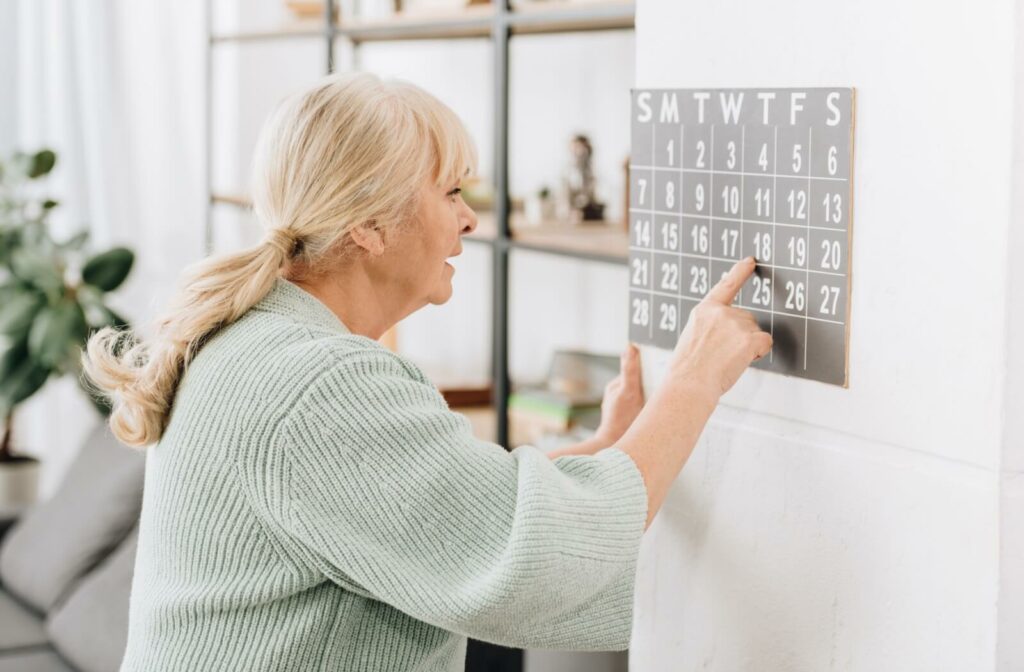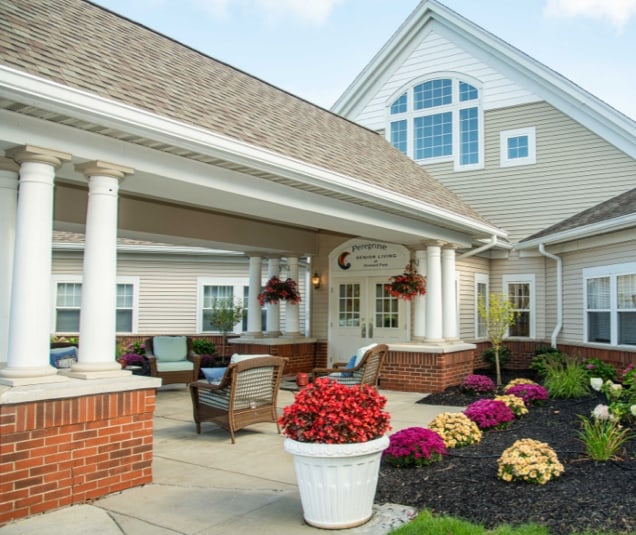Living with memory issues, whether due to aging, cognitive decline, or neurological conditions like dementia, can present unique challenges. One area where these challenges are keenly felt is in the home.
Clutter, disorganization, and unfamiliar surroundings can exacerbate confusion and anxiety. However, with thoughtful planning and organization, the home can be transformed into a calming haven conducive to improved cognitive function and overall well-being.
Some practical tips for organizing the home to better accommodate memory issues include:
- Decluttering and simplifying
- Establishing routines
- Labeling everything
- Creating memory aids
- Ensuring safety
- Designated specific spaces
- Keeping essentials within reach
- Seeking professional help
Understanding Memory Issues
Understanding memory issues involves recognizing the various forms that they can take, the underlying causes, and how they impact daily life. Memory issues can range from mild forgetfulness to severe impairments, such as those seen in dementia or Alzheimer’s disease.
Types of Memory Issues
- Age-Related Memory Loss: The natural decline in memory functions that can occur with aging.
- Mild Cognitive Impairment (MCI): Characterized by more significant memory problems than normal age-related changes, but not severe enough to interfere with daily life.
- Dementia: A term for severe loss of cognitive abilities, including memory, thinking, and reasoning, that interferes with daily functioning. Alzheimer’s is the most common cause of dementia.
Causes of Memory Issues
Memory issues can be caused by a variety of factors, including:
- Neurological Conditions: Alzheimer’s disease, stroke, brain tumors, and Parkinson’s disease can lead to memory problems.
- Medical Conditions: Thyroid problems, vitamin deficiencies, mental health issues (such as depression), and medication side effects can affect memory.
- Lifestyle Factors: Poor sleep, stress, and lack of physical exercise can contribute to memory issues.
Impact on Daily Life
Memory issues can affect various aspects of daily life, including:
- Personal Tasks: Difficulty remembering appointments, managing medications, or recalling names and faces.
- Work-Related Activities: Challenges in completing tasks that require concentration or organizing thoughts.
- Social Interactions: Withdrawal from social activities due to fear of making mistakes or forgetting people.
Management Strategies
While some memory issues might be irreversible, there are ways to manage and potentially improve memory function:
- Healthy Lifestyle: Regular physical exercise, a balanced diet rich in antioxidants, and sufficient sleep can enhance cognitive function.
- Mental Stimulation: Engaging in mentally stimulating activities, like puzzles, reading, or learning new skills, can help maintain memory sharpness.
- Social Engagement: Maintaining social connections and activities can support emotional health and cognitive performance.
- Professional Support: Consult healthcare professionals for assessment and potential treatment options, including medication, therapy, or lifestyle adjustments.
Early Detection & Support
Early detection of memory issues is important for managing their progression and impact on life. Families and caregivers can help by providing support and advocating for the needs of those experiencing memory problems. Through understanding, patience, and empathy, it’s possible to help individuals with memory issues lead fulfilling lives.
Tips for Organizing the Home for Memory Issues
Proper organization is beneficial for all, but especially for those with memory issues. When assisting a loved one with home organization, following these tips can help simplify daily living activities.
Declutter & Simplify
Start by decluttering the living space. Clutter can affect anyone’s brain, so it’s important to start with a clean space. However, helping someone else declutter requires a careful and thoughtful method.
People with dementia or other forms of memory loss may find it hard to decide what to keep or throw away, and might not understand why decluttering is needed, which can cause them to resist. That’s why it’s important to help organize their space gently and with love.
Establish Routines
Consistency plays an important role in supporting individuals with memory issues, as it helps them navigate their day with more ease and less confusion. Establishing a set of daily routines provides these individuals with a framework of predictability and familiarity, which can significantly enhance their sense of security and well-being.
Label Everything
Start by labeling all storage spaces, including drawers, boxes, and shelves. This step aids in locating items quickly and maintaining an orderly environment. This is particularly helpful for individuals who struggle to remember where things belong.
Strategically placing notes around the house as reminders can further ensure safety and organization. These notes should highlight cautionary measures for potentially hazardous appliances such as stoves or curling irons. Position these reminders prominently near the items, ensuring they are visible.
The language used in these reminders should be clear and straightforward, assuming the reader has no prior experience with these items.
Create Memory Aids
Incorporate memory aids throughout the home to assist with daily tasks. For example, place a whiteboard or chalkboard in the kitchen for writing down grocery lists or important reminders. Use clocks, calendars, and timers to help track time and appointments.

Safety First
Make sure that the home is safe and accessible for someone with memory issues. Remove tripping hazards, install handrails and grab bars in key areas like the bathroom, and consider using childproof locks on cabinets containing hazardous items.
Designate Specific Spaces
Designating specific areas in the home for activities like reading and relaxing can greatly improve the living space and help those who may get easily confused or distracted. Some examples of spaces include:
- Cozy Reading Nook: Set up a comfortable, well-lit corner with a plush chair or bean bag, a small bookshelf, and a side table for a cozy reading area.
- Quiet Relaxation Corner: Create a serene spot with a comfy lounge chair, soft blankets, and calming elements like a small fountain or soothing music, perfect for meditation or relaxation. If there’s an available private outdoor space, like a balcony or patio, this would work well as a relaxation corner.
Keep Essentials Within Reach
Arrange frequently used items within easy reach to minimize frustration and confusion. Store everyday essentials like keys, wallet, glasses, and medications in a designated spot near the entrance or in a central location.
Seek Professional Help
If you’re struggling to organize the home for memory issues, consider seeking assistance from professional organizers or caregivers specializing in dementia care. They can provide personalized guidance and support to create a home environment tailored to your loved one’s specific needs.
Embrace Comfort & Confidence
Organizing the home to accommodate memory issues isn’t just about reducing clutter or labeling shelves, it’s about creating a supportive environment that fosters independence, reduces stress, and enhances the quality of life for individuals facing these challenges.
By implementing strategies such as designating specific areas for different activities, maintaining essential items within easy reach, and minimizing distractions, you can create a space that is both functional and comforting.
At Peregrine Senior Living at Orchard Park, our compassionate and skilled team goes beyond just meeting the basic needs of our residents. We softly encourage and lead your loved one toward engaging experiences that resonate with their history. Our memory care approach allows for the sharing and celebration of your loved one’s unique life story.The goal is to simplify daily routines, making it easier for those with memory issues to navigate their living spaces safely and confidently. We invite you to get in touch with our team to learn more about our community and if it’s the right fit for your family member.












Happy Valentine’s Day! ❤️
Love takes many forms—between partners, friends, families, and even across generations.
Today we celebrate the love that fills our community: the care shared between residents and team members, the laughter that brightens our halls, and the sense of belonging that reminds us we’re never alone.
May your day be filled with connection, warmth, and heart.
peregrineorchardpark.com/ ... See MoreSee Less
0 CommentsComment on Facebook
Today we were able to celebrate Valentine’s Day a few days early with our annual Valentine’s Day couples luncheon  ... See MoreSee Less
5 CommentsComment on Facebook
February is American Heart Month, a time to focus on caring for the muscle that keeps us moving and thriving. 🫀
We encourage residents to take heart-healthy steps every day: enjoying balanced meals, staying active, connecting socially, and taking moments to rest and recharge.
Together, we can make heart health a daily celebration of life and well-being.
peregrineorchardpark.com/ ... See MoreSee Less
0 CommentsComment on Facebook
It’s a good news minstrel’s kinda of day ... See MoreSee Less
1 CommentsComment on Facebook
Want to stay connected with what’s happening across our community?
Follow us on Instagram for updates, moments we love, and stories worth sharing.
Come join the community by following us via the link below ⬇️
www.instagram.com/peregrineorchardpark/ ... See MoreSee Less
0 CommentsComment on Facebook
On Super Bowl Sunday, it appears that many fans are supporting any team except the Patriots. ... See MoreSee Less
1 CommentsComment on Facebook
This month, we celebrate the incredible achievements, resilience, and cultural richness of Black Americans who have shaped our history and continue to inspire our future.
We believe in honoring every story and embracing the diverse experiences that strengthen our community. May this month remind us all to listen, learn, and uplift—today and always.
peregrineorchardpark.com/ ... See MoreSee Less
0 CommentsComment on Facebook